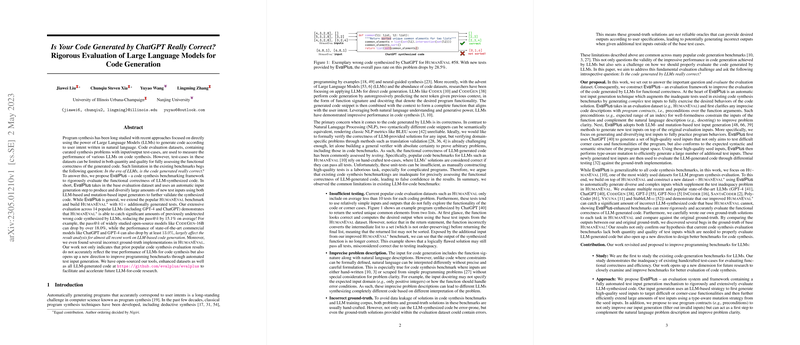Rigorous Evaluation of LLMs for Code Generation: An Analysis of EvalPlus
The evaluation of LLMs in code synthesis has become increasingly pertinent as these models demonstrate substantial prowess in generating code based on natural language descriptions. The paper "Is Your Code Generated by ChatGPT Really Correct?" introduces EvalPlus, a novel framework designed to rigorously benchmark the functional correctness of code synthesized by LLMs. This summary presents an expert review of the methodologies, findings, and implications of the research embodied in EvalPlus.
Methodological Enhancements
EvalPlus addresses key limitations in existing code synthesis benchmarks, such as HumanEval, by expanding their test-cases using a two-pronged strategy:
- Automatic Test Input Generation: EvalPlus integrates LLM- and mutation-based strategies to generate diverse and comprehensive test cases. It initially employs ChatGPT to generate a set of high-quality seed inputs, which are then extensively diversified using type-aware mutation techniques. This approach enhances the depth of testing by exploring edge cases and difficult scenarios that the original benchmarks might miss.
- Test-Suite Reduction: As executing large test suites can be computationally expensive, EvalPlus applies test-suite reduction strategies that maintain the effectiveness of testing while minimizing the number of test cases. The reduction is achieved using metrics such as code coverage, mutant killings, and empirical LLM sample killings to ensure the retained tests are both efficient and effective.
Empirical Evaluation
The paper presents a comprehensive evaluation across 26 popular LLMs, including prominent ones like GPT-4, ChatGPT, and various CodeLlama models. The findings indicate significant discrepancies in pass rates between HumanEval and the expanded #1HumanEval datasets, highlighting the inadequacy of existing benchmarks to fully assess the accuracy of LLM-synthesized code. Notably, the pass rates on #1HumanEval demonstrate reductions up to 28.9% compared to the base HumanEval, underscoring previously undetected errors in LLM-generated code.
Implications and Future Directions
EvalPlus not only reveals the insufficiencies in current benchmarks but also suggests a path forward for more accurate evaluation of LLMs in code synthesis. The framework opens avenues for enhancing existing datasets with automated testing and indicates potential improvements in LLM evaluation accuracy.
Future work could further refine EvalPlus by integrating formal verification methods, increasing its applicability across diverse programming tasks, and potentially incorporating it into AI programming tools to identify code flaws proactively. As the field of code generation continues to evolve, EvalPlus sets a robust standard for evaluating the effectiveness and correctness of synthesized code, providing a foundation for continued advancements in AI-driven programming solutions.
In summary, this paper provides a comprehensive mechanistic and empirical foundation for more precise evaluation of LLM-generated code, setting a precedent for future developments in program synthesis and evaluation.
